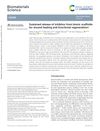 67 citations,
February 2020 in “Journal of Ginseng Research”
67 citations,
February 2020 in “Journal of Ginseng Research” Korean Red Ginseng has beneficial components that help with stress, immunity, fatigue, memory, blood flow, and disease protection.
 July 2023 in “Bioengineering & translational medicine”
July 2023 in “Bioengineering & translational medicine” Mesenchymal stem cell proteins in a special gel improved healing of severe burns.
 355 citations,
August 2013 in “Acta Biomaterialia”
355 citations,
August 2013 in “Acta Biomaterialia” The nanofibers with two growth factors improved wound healing by supporting structure, preventing infection, and aiding tissue growth.
 November 2023 in “Regenerative Biomaterials”
November 2023 in “Regenerative Biomaterials” The new adhesive seals wounds quickly, works well in wet conditions, and helps with healing.
 68 citations,
March 2019 in “Advanced Healthcare Materials”
68 citations,
March 2019 in “Advanced Healthcare Materials” Advanced hydrogel systems with therapeutic agents could greatly improve acute and chronic wound treatment.
12 citations,
June 2023 in “International Journal of Molecular Sciences” Innovative biomaterials show promise in healing chronic diabetic foot ulcers.
 2 citations,
January 2023 in “Ceramics International”
2 citations,
January 2023 in “Ceramics International” The 3D printed scaffold with SB216763 and copper helps heal wounds and regrow skin and hair.
 3 citations,
December 2023 in “Cell proliferation”
3 citations,
December 2023 in “Cell proliferation” Stuff from umbilical cord stem cells helps skin heal and look younger.
 4 citations,
December 2023 in “Advanced science”
4 citations,
December 2023 in “Advanced science” New injectable hydrogels with gelatin, metal, and tea polyphenols help heal diabetic wounds faster by controlling infection, improving blood vessel growth, and managing oxidative stress.
April 2024 in “Journal of composites science” Hydrogel composites have great potential in regenerative medicine, tissue engineering, and drug delivery.
110 citations,
April 2020 in “Advances in Wound Care” Nanotechnology shows promise for better chronic wound healing but needs more research.
 8 citations,
January 2020 in “Biomaterials Science”
8 citations,
January 2020 in “Biomaterials Science” Researchers developed a scaffold that releases a healing drug over time, improving wound healing and skin regeneration.
 2 citations,
March 2021 in “Journal of Cosmetic Dermatology”
2 citations,
March 2021 in “Journal of Cosmetic Dermatology” Umbilical cord-derived media is safe and effective for hair growth.
 43 citations,
February 2020 in “Clinica chimica acta”
43 citations,
February 2020 in “Clinica chimica acta” Nano-sized plant-based chemicals could improve cervical cancer treatment by being more effective and causing fewer side effects than current methods.
 31 citations,
February 2021 in “Nutrients”
31 citations,
February 2021 in “Nutrients” Curcumin may improve blood sugar levels and cholesterol in people with PCOS, but more research is needed.
 1 citations,
December 2023 in “Egyptian Journal of Veterinary Science”
1 citations,
December 2023 in “Egyptian Journal of Veterinary Science” Astragalus polysaccharides nanogel heals wounds better than Gold-Silver nanocomposite gel.
 April 2024 in “Journal of cancer research and clinical oncology”
April 2024 in “Journal of cancer research and clinical oncology” Tissue-derived extracellular vesicles are crucial for cancer diagnosis, prognosis, and treatment.

Human hair keratins can be turned into useful 3D biomedical scaffolds through a freeze-thaw process.
 46 citations,
January 2020 in “Theranostics”
46 citations,
January 2020 in “Theranostics” Injecting a special gel with human protein particles can help hair grow.
 45 citations,
January 2020 in “Pharmaceutical Biology”
45 citations,
January 2020 in “Pharmaceutical Biology” Dendrobium officinale polysaccharides may help with hair growth, skin moisturization, and protection against oxidative damage.
 29 citations,
September 2020 in “International Journal of Molecular Sciences”
29 citations,
September 2020 in “International Journal of Molecular Sciences” The document concludes that freeze-dried platelet-rich plasma shows promise for medical use but requires standardization and further research.
 24 citations,
January 2019 in “Biomaterials Science”
24 citations,
January 2019 in “Biomaterials Science” The shape of fibrous scaffolds can improve how stem cells help heal skin.
 February 2023 in “Asian journal of pharmaceutical research and development”
February 2023 in “Asian journal of pharmaceutical research and development” Flavonoids in Iraqi marshland plants have potential health benefits like antioxidant and anti-inflammatory effects.
 421 citations,
January 2015 in “Chemical Society Reviews”
421 citations,
January 2015 in “Chemical Society Reviews” Improving artificial vascular grafts requires better materials and surface designs to reduce blood clotting and support blood vessel cell growth.
 28 citations,
September 2020 in “Pharmaceutics”
28 citations,
September 2020 in “Pharmaceutics” 3D-printed mesoporous scaffolds show promise for personalized drug delivery with controlled release.
 19 citations,
July 2018 in “Medicines”
19 citations,
July 2018 in “Medicines” Juniperus plants contain compounds with potential for developing various medical treatments.
 December 2023 in “Frontiers in endocrinology”
December 2023 in “Frontiers in endocrinology” Excess androgens may cause PCOS, not just be a symptom.

Human hair keratins can self-assemble and support cell growth, useful for biomedical applications.
 January 2015 in “Springer eBooks”
January 2015 in “Springer eBooks” Hormones affect skin aging, and treatments targeting hormonal balance may improve skin health.
5 citations,
March 2022 in “Frontiers in Cell and Developmental Biology” Colostrum-derived exosomes can promote hair growth and may be a promising treatment for hair loss.


























